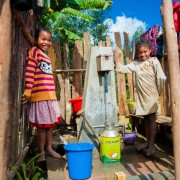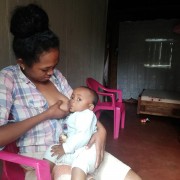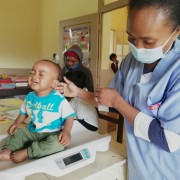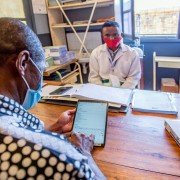Speeches Shim

For too many years, the communities of Anosibe Ifody (Moramanga, Alaotra Mangoro region) and Niarovana Caroline (Vatomandry, Atsinanana region) in Eastern Madagascar have struggled under the burden of undependable, contaminated water sources that led to sickness and poor sanitation. Anosibe Ifody was plagued with water quality problems including siltation during the rainy season and bacteriological contamination. Meanwhile, the citizens of Niarovana Caroline frequently face bouts of bilharziasis, a disease caused by a water-born pathogen.

25-year-old Victoria Rebezara, from the village of Ampasimbola in eastern Madagascar, is a happy mother of a 7-month-old baby boy, Keychann. Keychann is growing well and is totally healthy. Victoria has breastfed him since birth – advice given by her local Community Health Volunteer (CHV). "I have exclusively breastfed my little boy from birth until he was six months old, as the CHV advised. He has not been severely ill so far, and he has the appropriate weight for his body size and age. Breastfeeding hasn’t been difficult and I’ve had a good supply of milk. I breastfeed at least ten times in the morning and on-demand at night," she says.

Encouraging new mothers to exclusively breastfeed their babies is standard practice at Vavatenina’s primary health center, according to Dr. Tiarisoa Léocadie Bernard, the facility’s head doctor. In addition to the center’s health workers to promote exclusive breastfeeding, the local community health volunteers (CHVs) are routinely reminded about the importance of this healthy practice during monthly meetings, an activity supported by USAID’s Mahefa Miaraka program.

The U.S. Government’s President’s Malaria Initiative (PMI) and the United States Agency for International Development (USAID) are donating 65 tablet computers to support the Government of Madagascar’s plan to stamp out malaria in the districts of Antsirabe II and Antsiranana I. The U.S. Government, through PMI and USAID, supports Madagascar’s Ministry of Public Health and the National Malaria Control Program (NMCP) to reduce malaria in Madagascar. Part of the national anti-malaria strategy is to completely eliminate malaria in districts that have a low number of cases.
“While we are currently battling the COVID-19 outbreak, we must continue to be vigilant against other threats to our public health and safety. Malaria remains a significant challenge and a risk to the health and well-being of Malagasy people,” stated U.S. Ambassador Michael P. Pelletier, as he announced a significant donation from the U.S. Government for the detection and treatment of malaria cases in Madagascar.


![Cover: Paradise Lost? Lessons from 25 years of environment programs in Madagascar - Click to read publication [PDF, 3MB] Cover: Paradise Lost? Lessons from 25 years of environment programs in Madagascar](https://2017-2020.usaid.gov/sites/default/files/styles/732_width/public/nodeimage/paradise_lost_0.jpg?itok=klue3vb3)
Comment
Make a general inquiry or suggest an improvement.